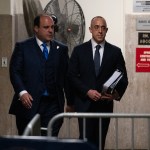As I noted in the post below, the Associated Press is standing by the assertion that House health care legislation will cost $1.5 trillion, even though it now says, based on its own analysis, that the same bill will likely cost $1.65 trillion.
This is puzzling on its own, but as Greg Sargent notes, it’s also pretty irresponsible.
[T]he AP doesn’t address the core problem here: That it keeps portraying its price tag as a matter of fact, rather than as a matter of dispute….
Even if you agree that the bill is likely to cost [$1.5 trillion] in the end, it’s still reckless of the AP to keep treating this number as established fact, when it simply isn’t any such thing. More on this in a bit.
Right. Something that’s been elided here–and I’m guilty of this to some extent–is that Tuesday’s CBO analysis isn’t conclusive analysis. It’s a preliminary analysis based on, in the words of Doug Elmendorf, “the major provisions related to health insurance coverage [and] does not take into account other parts of the proposal that would raise taxes or reduce other spending (particularly in Medicare) in an effort to offset the federal costs of the coverage provisions.”
Right now, the most accurate thing one can say with confidence is that an early CBO analysis estimates that the coverage-related provisions of the bill–provided to CBO by House committee staff–will add about $1 trillion to the federal deficit. When all’s said and done, the number will probably be different. All along, most experts have expected a complete reform proposal to cost about $1.2 or $1.3 trillion.
But the AP continues to report as fact that the bill costs $1.5 trillion, when no government analysis supports this finding. And if in a few days or weeks, a final CBO score concludes–in an incredibly unlikely turn of events–that the bill will cost $1.5 trillion on the nose, then that would not vindicate the AP in any way. Rather, it would constitute a huge coincidence.
One budget expert tells me that much of this entire legislative endeavor, and the administration’s arbitrary goal of reforming the health care system at a “cost” of $1 trillion, has confused the entire budget process. A number of provisions in the bill will yield funds the government needs to to complete an overhaul. But it’s not always clear which of those provisions ought to count as new revenues, and which ought to be thought of as measures that simply reduce the cost of the program. The AP says that penalties incurred by individuals and employers who don’t abide by the terms of the bill’s mandates should be counted as new revenue. The expert I spoke with said that’s a plausible interpretation, but that there’s no consensus on the question.
But in a way that’s all a distraction from the issue of the AP’s reportage. Looking at the timeline, what seems most likely to me is that the AP ran with a report, based on the off-the-record contentions of a congressional aide, that the House health care bill will cost $1.5 trillion; and that, after taking considerable heat for doing so, tried to retroactively justify the figure.









